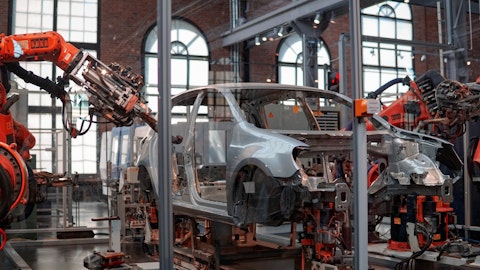I mean, how should we think about this going forward? Because there are new businesses that are kind of adjacent businesses that are popping up that might be drawn on capital or may not even be that big a drawn capital may be incremental on their own. Just how do you think about that?
Mike Manley: John, the very first thing that we think about is what is the best use of capital for our shareholders perspective. And clearly, you have seen over the last two years given the market conditions and the overvaluation of assets out there the best return — was to return it to our shareholders and we’re very clear on that and that will continue. Our discipline will continue to be with that in mind. Now I’m going to expand on some of the things that you talked about. There are a lot of really our approach is to firstly maximize the assets that we have in place and inappropriate circumstances to add to that, that will broaden our geographical coverage, but very deliberate. We have an embedded asset in the organization, a very significant customer base over a long period of years has now built significantly.
But the reality is that not all of those customers are active and our share of their wallet is relatively narrow. Maybe it sells, used it sales and service. But their total spend on transportation and mobility, whichever buzzwords you want to use is very, very broad. So our approach really is to expand our business, our geographical reach, so that we can continue to add more customers to our base, understand why customers over time become inactive and that’s typically, because the ages of the vehicle that they have is beyond seven or eight years and they therefore believe it’s the right thing to do for them to move out of a franchise environment or they moved outside of a 25 mile radius of our stores and therefore our penetration in the aftersales part drops off.
RepairSmith is an ideal solution for that, because not only are they incredibly convenient and overcome that geography limitation, they’re also able to package — also able to package their services in a way that they’re not underselling their services, but when you value the convenience of them coming to you, it means our customers are likely to think about them as well. And the other consequence of RepairSmith, frankly, is it provides for our AutoNation USA stores a great USP, because imagine now not only being able to buy a phenomenal used vehicle, we’re backed by AutoNation, you now have access to a team of professional service providers that will give you the most convenient service option in the used car business in our opinion. So when we think about the businesses that we buy, what we’re thinking about really is the needs of our existing customers, not even — if you imagine not even including these — sometimes of the 300,000 customers that are added to our base each year, so our approach really is to reactivate those customers that are looking for a different type of service that is not traditionally provided by franchise store and we’re adding businesses and we’re adding open term and growing them as well as buying them.
That will help that to make sure that we can reactivate those customers and then broaden the services we offer. I think it — well, that hopefully — that’s relatively clear in terms of what we are doing. And I think the acquisitions that we’ve made and the businesses that we’re trying to grow internally are really directed at that.
John Murphy: Any intention on that financing?
Joe Lower: If I could just add.
John Murphy: Yes.





